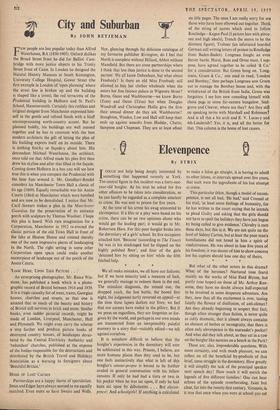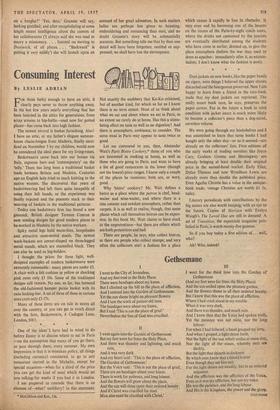Elevenpence
By STRIX ICOULD not help being deeply interested by something that happened recently at York. The central figure in this incident was a forty-one- year-old burglar. At his trial he asked for five other offences to be taken into consideration, so he can hardly be regarded as a complete amateur in crime. He was sent to prison for five years.
At the time of his arrest his swag amounted to elevenpence. If a film or a play were based on his crime, there can be no two opinions about who would get the leading part; it would go to Mr. Robertson Hare. For this poor burglar broke into the dormitory of a girls' school. Its five occupants attacked hirri. 'Because' (according to The Times) 'he was in his stockinged feet he slipped on the highly polished floor'; and four of the girls 'detained him by sitting on him' while the fifth fetched help.
We all make mistakes, we all have our failures; but if we have tenacity 'and a measure of luck, we generally manage to redeem them in the end. The mistaken diagnosis, the missed cue, the dropped catch, the lost battle, the booed first night, the judgement tartly reversed on appeal—at the time these lapses darken our lives; we feel that our careers have ended in the pillory. But if we press on regardless, they-are forgotten or for- given by the world, and perhaps-in our own minds are transmuted from an inexpressibly painful memory to a story that—suitably edited—we tell against ourselves.
It is somehow difficult to believe that the burglar's experiences in the dormitory will ever be sublimated in this way. Prisons, I believe, are more humane places than they used to be, but one feels instinctively that what is left of this burglar's amour-propre is bound to be further eroded in general conversation with his fellow inmates. If only he had had a tiara or two\ in his pocket when he was sat upon, if only he had been sat upon by ddbutantes. . . . But eleven- pence!. And schoolgirls! If anything is calculated to make a felon go straight, it is having to admit to other felons, at intervals spread over five years, that such were the ingredients of his last attempt at crime.
This particular felon, though a model of incom- petence, is not all bad. 'He had,' said Counsel at his trial, 'at least some feelings of humanity, for he has written to the court saying that he intends to plead Guilty and asking that the girls should not have to spoil the holidays they have just begun by being called to give evidence.' Chivalry is rare these days, but this is it. We are not quite on the level of Sidney Carton, but at least the poor man's humiliations did not breed in him a spirit of vindictiveness. He was about io lose five years of his freedom; it was decent of him to show concern lest his captors should lose one day of theirs.
But what of the other actors in this drama? What of the heroines? Nurtured (one fears) mainly on the works of Miss Enid Blyton, brit partly (one hopes) on those of Mr. Arthur Ran- some, they have no doubt always half-expected to be involved in some desperate adventure. Are they, now that all the excitement is over, tasting faintly the flavour of disillUsion, of anti-climax? Are they already beginning to suspect that fact, though often stranger than fiction, is never quite as tidily dramatic, that it almost always contains an element of bathos or incongruity, that there is often only elevenpence in the marauder's pocket? And what did they talk about, as they sat in a row on the burglar like nannies on a bench in the Park?
These are, alas, imponderable questions. With more certainty, and with much pleasure, we can reflect on all the beneficial by-products of that brief, tense struggle in' the dormitory. How greatly it will simplify the task of the principal speaker next speech day! How 'much it will enrich the legends of five different families! One can hear echoes of the episode. reverberating, faint but clear, far into the twenty-first century. 'Grannie, is it true that once when you were at school you sat on a. burglar?' 'Yes, dear,' Grannie will say, looking gratified; and after recapitulating at some length recent intelligence about the careers of her collaborators CI always said she was mad to marry a missionary. . . . Insisted on moving to Droitwich, of all places. . . . "Backward" is putting it very mildly') she will launch upon an account of her great adventure. In such matters ladies are perhaps less given to boasting, embroidering and romancing than men, and no doubt Grannie's story will be substantially accurate. But something tells melhat by then one detail will have been forgotten, omitted or sup- pressed; we shall have lost the elevenpence.



































 Previous page
Previous page